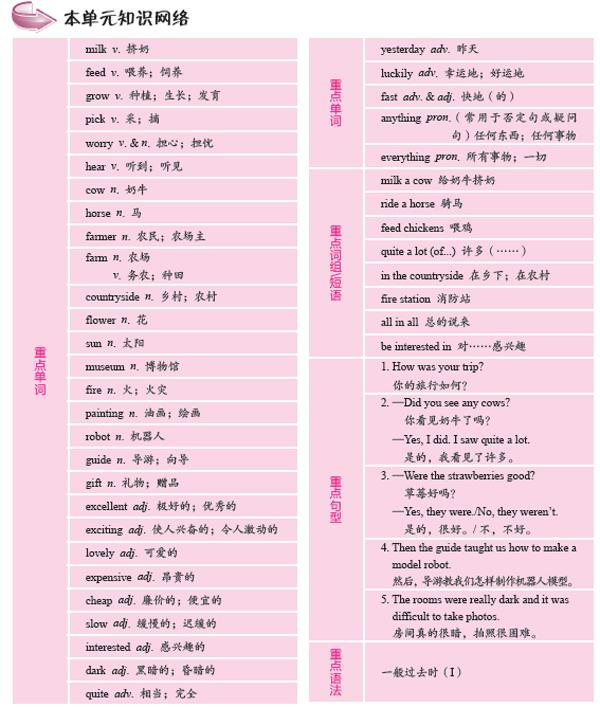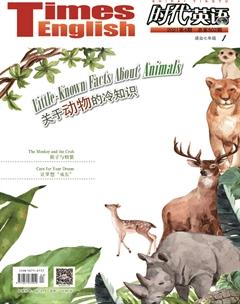Unit 11?How was your school trip?

重点知识园地
Section A
1. —Did you see any cows?
你看到奶牛了吗?
—Yes, I did. I saw quite a lot.
是的,我看到了许多奶牛。
quite a lot意为“许多;相当多”,可以单独使用,也可跟of + 可数/不可数名词。
We drank quite a lot of wine.
我们喝了不少酒。
I saw quite a lot of flowers.
我看到了相当多的花。
表示“相当多”,还可以用quite a little和quite a few。quite a little后跟不可数名词;quite a few后跟可数名词复数。
Theres still quite a little milk in that bottle.
那个瓶里还有不少牛奶。
Quite a few students were late yesterday.
昨天有许多同学迟到。
2. Did Carol take any photos?
卡罗尔拍照片了吗?
take与photo,picture等词搭配时,表示“拍摄;摄影”。
(1)表示“拍摄某物或人”,后接介词of。
She likes to take photos of animals.
她喜歡给动物照相。
(2)表示“替/为……拍照”,后接介词for。
Could you take a photo for me here?
你能在这儿给我拍张照吗?
(3)表示“和……照相;用……照相”,后接介词with。
May I take a photo with you?
我能和你一起拍张照吗?
Take a photo with your mobile phone!
用你的手机拍张照吧!
3. Did you learn anything?
你学到东西了吗?
(1)anything pron.“任何东西;任何事物”,常用于否定句或疑问句中。不定代词something常用于肯定句中。
I knew something about the movie.
关于这部电影,我了解一些。
Did you know anything about the book?
你对这本书有所了解吗?
(2)否定句中not... anything相当于nothing。
I didnt know anything about the movie.
= I knew nothing about the movie.
我对这部电影一无所知。
(3)形容词修饰anything/something时,要放在其后面。
Is there anything new in this book?
这本书里有新的内容吗?
4. Lucky you.
你真幸运。
这是一句非正式用语,相当于Youre so lucky.
Lucky之后的人称还可以改为me,him等。
5. ... we worried it would rain.
……我们担心会下雨。
(1)worry v. & n. 担心;担忧
Dont worry about your little boy.
不用操心你年幼的儿子。
I have a lot of worries.
我有很多担忧。
(2)worried adj. 焦虑的
常与系动词be/look/feel连用,构成系表结构。
be worried about... 为……担心
I was worried about you.
我很担心你。
GRAMMAR FOCUS
一般过去时(I)
一般过去时表示过去某个时间或某一段时间内发生的动作或存在的状态。
构成:
(1)be动词的过去式
am,is的过去式是was;are的过去式是were。
(2)实义动词的过去式
① 在动词原形末尾加-ed。
work—workedhelp—helped
② 以e结尾的动词后直接加-d。
live—liveduse—used
③ 末尾只有一个辅音字母的重读闭音节时,应双写最后这个辅音字母,再加-ed。
stop—stopped plan—planned
④ 以辅音字母加y结尾的动词,先将y变成i,再加-es。
study—studiedcry—cried
⑤ 一些动词的不规则变化。
read—read let—let do—did
go—went have—had eat—ate
bring—brought lend—lent know—knew
swim—swam begin—began feel—felt
活学活用
用所给词的适当形式填空。
1. Carol ____ (take) photos on the farm last week.
2. ____ you ____ (see) Mr Zhang just now?
3. Jim ____ (get) up at half past six yesterday morning.
4. Where ____ (be) your mother this morning?
5. The boy ____ (not go) out for a walk with his friends last night.
写出下列单词的过去式。
6. feed ____ 7. see ____ 8. go ____
9. make ____ 10. grow ____ 11. show
12. ride ____ 13. hear ____ 14. pick ____
Section B
1. I didnt know they could play chess with us.
我不知道他们能和我们下棋。
play后面接球类、棋类、牌类等体育运动名称时,前面不加冠词,如:play basketball打篮球;play chess下棋;play cards玩牌。
play后接乐器时,前面则加定冠词,如:play the violin拉小提琴;play the piano弹钢琴。
2. Then the guide taught us how to make a model robot.
然后导游教我们怎样制作机器人模型。
(1)teach sb to do sth 教某人做某事
My best friend teaches me to play computer games.
我最好的朋友教我玩电脑游戏。
(2)teach sb sth 教某人某事
Our English teacher teaches us English.
我们英语老师教我们英语。
3. All in all, it was an exciting day.
总的来说,那天是令人兴奋的一天。
(1)all in all 总的来说;总而言之
All in all, I think you did a good job.
总而言之,我认为你做得很棒。
(2)an exciting day 让人兴奋的一天
exciting adj. 让人兴奋的,令人兴奋的(多用于形容物)
excited adj. 感到兴奋的(多用于形容人)
Its exciting for her to spend the holiday in Rome.
到罗马度假使她很兴奋。
The children were all excited, and George felt pleased.
孩子们都很兴奋,乔治感到很开心。
4. Everything was about robots and Im not interested
in that.
一切都与机器人有关,我对那不感兴趣。
比较:interesting和interested
(1)interesting adj. 令人感兴趣的,主语通常是物。
The book is very interesting.
这本书很有趣。
(2)interested adj. 感兴趣的,主语通常是人。
be interested in (doing) sth 对(做)某事感兴趣
He is interested in the movie.
他对这部电影感兴趣。
He is interested in playing football.
他对踢足球感兴趣。
5. The rooms were really dark and it was difficult to
take photos.
房间真的很暗,拍照很困难。
It is + adj. (for sb) to do sth.
(对某人来说)做某事……
It is easy for me to go to school by bike.
對我来说,骑自行车去上学很容易。
It is necessary for us to study English hard.
努力学习英语对我们来说很有必要。
活学活用
用be动词的适当形式填空。
15. I ____ at school just now.
16. He ____ at the camp last week.
17. We ____ students two years ago.
从方框中选择适当的词,并用其正确形式填空(每词限用一次)。
write have be study clean
18. I ____ a party for my friend in the park last weekend.
19. Jim ____ a letter to his pen pal once a month last year.
20. I helped my son do some ____ yesterday evening.
21. They ____ for the math test last night.
22. ____ your teacher busy last week?
基礎过关
单项选择
( ) 1. —___ ?
—It was good.
A. How did you do it B. How was your trip
C. What did you do D. What did he say
( ) 2. ___ you ___ to Lucys birthday party yesterday?
A. Do; go B. Do; went
C. Did; go D. Did; went
( ) 3. Cathy and Ruth ___ the classroom every day.
A. clean B. cleans
C. cleaned D. cleaning
( ) 4. My parents ___ late yesterday.
A. get to home B. get home
C. got to home D. got home
( ) 5. Im really ___ about my brother.
A. worry B. worries
C. worried D. worrying
根据首字母填写单词
1. The clock is about two minutes s .
2. When did you f this cow?
3. My father g many strawberries last year.
4. Lets go home quickly. Its getting d .
5. This shirt is expensive. Could you show me a c one?
用所给词的适当形式填空
1. Jennys mother(pick) some apples yesterday.
2. There are different kinds of(flower) in the park.
3. These two men are our(guide) on the trip.
4.(lucky), he was there and helped me.
5. Did you get any(gift) on your birthday?
按要求完成句子
1. Our school trip was excellent.(对画线部分提问)
your school trip?
2. Mary played volleyball yesterday afternoon.(改为否定句)
Mary volleyball yesterday afternoon.
3. John has no brother and no sister.(改为同义句)
Johnhave a brothera sister.
4. Tina did very well in her English exam.(改为一般疑问句)
Tinavery well in her English exam?
5. My father is always busy with his work.(用last week改写)
My father busy with his work last week.
6. 今天我们有许多工作要做。(完成译句)
Today we have
work to do.
7. 总的来说,他是一个不错的足球运动员。(完成译句)
, he is a good soccer player.
8. 我弟弟对数学感兴趣。(完成译句)
My brothermath.
9. last, trip, your, school, was, weekend, how(连词成句)
?
10. were, paintings, the, excellent(连词成句)
.
补全对话
A: Hi, Tom! 1
B: It was exciting. I went back to my hometown with my parents.
A: Oh, nice. 2
B: No, we went there by car. My father drove all the way.
A: So what did you do there?
B: 3 It was so interesting.
A: Sounds good. 4
B: It was nice and warm. 5
A. How was your weekend?
B. Did you go there by bus?
C. We had a great time there.
D. How was the weather there?
E. I went fishing and boating with my grandpa.
1. 2. 3. 4. 5.
閱读理解
A
This happened about two years ago. I went to an art festival in France with my friends. The festival would last (持续) 5 days.
When we arrived the weather was great. It was very hot and sunny, so we went to the mountains for camping (露营). But in the mountains the weather changed quickly. That night there was a terrible storm. At first we didnt worry about it, but it started to rain heavily and there was a strong wind. A little later, water started coming into the tent (帐篷). In the end, we had to leave and take our things to a hotel. There werent any rooms free, so they let us sleep in the dining room. The next morning it was sunny again. But our tent wasnt there. The wind blew it away at night.
( ) 1. Where did the writer go for the art festival?
A. To France. B. To the UK.
C. To the USA. D. To China.
( ) 2. How was the weather when the writer arrived?
A. Rainy and windy. B. Snowy and cold.
C. Rainy and cool. D. Sunny and hot.
( ) 3. What does the word “storm” mean in Chinese?
A. 暴风雨 B. 雨夹雪
C. 冰雹 D. 大雾
( ) 4. Where did the writer sleep that night?
A. At home. B. In a hotel.
C. In the tent. D. At a friends home.
( ) 5. Which is TRUE?
A. The art festival was one week long.
B. The writer didnt enjoy the camping.
C. The writer couldnt find his bag the next morning.
D. The bad weather in the mountains lasted two days.
B
Dear Marco,
Michelle and I had a nice trip in Beijing. When we stayed in Beijing, we lived with Zhang Yang, our Chinese friend, and his family. Have a look at our activities (活动) there.
On May 9th Arrived in Beijing.
On May 10th Visited the Great Wall with Zhang Yang.
On May 11th Visited Tiananmen Square and Beijings hutongs.
On May 12th Visited the Palace Museum with Zhang Yang and his sister.
On May 13th Went shopping in Wangfujing Street and bought gifts for our family. Michelle bought a toy for her brother and a scarf (围巾) for her sister. I bought a T-shirt for my father and a hat for my mother.
On May 14th Said good-bye to Beijing.
Hope you can go with us next time.
Yours,
Bonnie
( ) 6. How long did Bonnie and Michelle stay in Beijing?
A. Four days. B. Six days.
C. A week. D. Half a month.
( ) 7. What did Bonnie and Michelle visit on May 12th?
A. The Great Wall. B. Beijings hutongs.
C. The Palace Museum. D. Tiananmen Square.
( ) 8. What did Bonnie buy for her mother?
A. A toy. B. A T-shirt.
C. A hat. D. A scarf.
( ) 9. How many places did Bonnie and Michelle visit in Beijing?
A. Two. B. Three.
C. Four. D. Five.
( ) 10. Which is TRUE?
A. Zhang Yang comes from Beijing.
B. This e-mail is from Marco to Bonnie.
C. Michelle bought a T-shirt for her father.
D. Bonnie visited the Great Wall on the second day.
完形填空
Yesterday was Sunday. The weather was 1 . “Lets go to the beach!” Dad said to Polly. Polly was very happy because she could 2 there. Polly went to the beach 3 Mom and Dad.
When they 4 there, they saw many people on the beach. Some people swam in the water 5 some played with a beach ball. Polly ran happily. “Lets swim!” she said to Dad.
Polly and Dad were 6 and thirsty (口渴的) after swimming. They drank some water. Then Mom bought them some ice-cream. “It is 7 ! Thank you, Mom,” said Polly. Then Polly 8 some beautiful shells (貝壳) on the beach. When it got dark, Polly and 9 parents decided to leave. On their way home, they went to a 10 and had dinner there. “Today is great!” said Polly.
( ) 1. A. cold B. cool C. hot D. warm
( ) 2. A. sing B. draw C. dance D. swim
( ) 3. A. with B. to C. for D. of
( ) 4. A. got B. lived C. left D. started
( ) 5. A. or B. if C. and D. so
( ) 6. A. scared B. tired C. lucky D. special
( ) 7. A. terrible B. cheap C. delicious D. natural
( ) 8. A. picked B. bought C. grew D. killed
( ) 9. A. his B. their C. my D. her
( ) 10. A. bank B. restaurant C. library D. museum
选词填空
阅读短文,从方框中选择适当的词,并用其正确形式填空(每词限用一次)。
museum photo relax sun visit
be delicious real play spend
The beach (海滩) is a good place for vacation. I1my last summer vacation with my friends there. The weather
was hot and2 . We went swimming in the sea (海) and
3beach volleyball on the beach. When we4tired
(疲倦的), we lay (躺) on the beach and5 . I took many
6of the beach. Some of them are very beautiful. There is a7near the beach. I spent one day8it. I saw many old things about the sea in it. There are also some shops near the beach. We could buy all kinds of9food in the shops. We10had great fun on the beach. And we want to spend our next vacation there, too.
1. 2. 3. 4. 5.
6. 7. 8. 9. 10.
書面表达
假如你是李明, 昨天你和你的英国朋友Jane一起去森林公园游玩。请写一篇60词左右的英语短文,描述一下这次郊游,内容包括:
1. How was the weather yesterday?
2. How did you go to the park?
3. What did you do in the park?
参考词汇:森林公园 forest park

